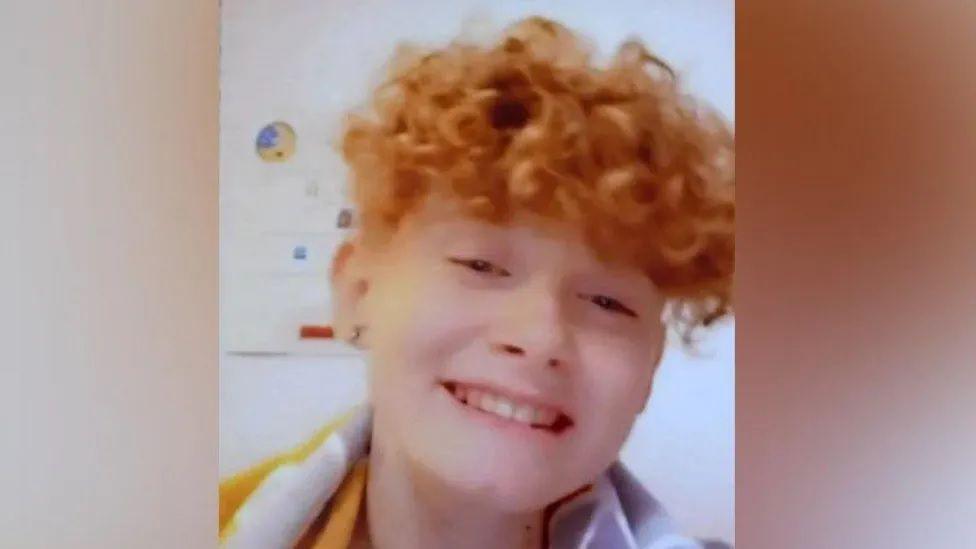Boy did not intend to take own life, inquest finds

Charlie Millers died at the Prestwich mental health hospital in 2020
- Published
A teenager who died after self-harming in a secure mental health hospital did not intend to take his own life, a jury has concluded.
Charlie Millers, 17, died on 7 December 2020 on the Junction 17 wing at Prestwich Hospital.
The jury at his inquest in Rochdale also concluded that a lack of one-to-one care on the night he died probably contributed to his death.
Outside the court, his mother said Charlie and his family were "failed".
Charlie Millers' family gathered outside the coroners court
Rochdale Coroners Court heard Charlie had suffered severe bullying since publicly identifying as a boy from the age of 12, and that he had been admitted to Junction 17 on three occasions from the age of 17.
His mother Sam told the jury that she struggled to keep him safe during periods of home leave and locked household items away in her bedroom so that he couldn't hurt himself.
The court heard that Charlie was known to self-harm while at Junction 17, especially after returning from home leave.
The jury said Trafford Children's Services did not engage with mental health services and "failed to provide support for Charlie's mum and siblings".
It also concluded that a nurse who was responsible for his care did not know he had low haemoglobin levels on the night of his death.
Had this been known to the nurse, he would have had one-to-one care that probably could have prevented his death, the jurors concluded.
Speaking outside the court, Charlie's mother Sam said she would look to call for a public inquiry.
But she said was glad questions have been answered after the "constant fight" for support.
"It was just sad that he was failed, we were failed as a family by so many people."
Coroner's concerns
Charlie was one of three young people to die at the service - which is run by Greater Manchester Mental Health NHS Trust - over a nine-month period.
Senior Coroner Joanne Kearsley told the jury that action needs to be taken to prevent future deaths and will write to the agencies involved.
She said she was concerned about the quality of investigations, adding "if there is going to be effective learning from these deaths it must be done quickly".
The coroner also raised the lack of a mental health social worker at Trafford Council as a concern.
Ms Kearsley told the jury she will write to the Home Office, the Department for Health and Social care and local agencies for their response to this case.
'Lessons'
Trafford Council said it "took on board the coroner's recommendations".
It said it would "learn lessons" from the "tragic case".
A spokesperson added: "We have already taken significant steps to make improvements and strengthen our practice and service delivery.
"We have undertaken a whole service redesign and this has included establishing specific services in order to raise the status of our support and intervention in this area.
"We are actively working with our Safeguarding Partnership to enhance our practice when young people are in crisis to improve their care."
Listen to the best of BBC Radio Manchester on Sounds and follow BBC Manchester on Facebook, external, X, external and Instagram, external? You can also send story ideas to northwest.newsonline@bbc.co.uk, external
Related topics
- Published24 April
- Published8 April